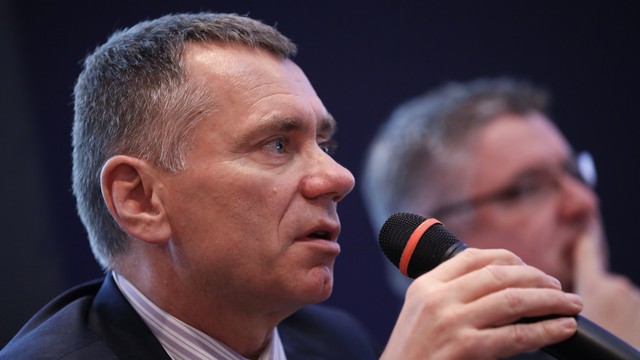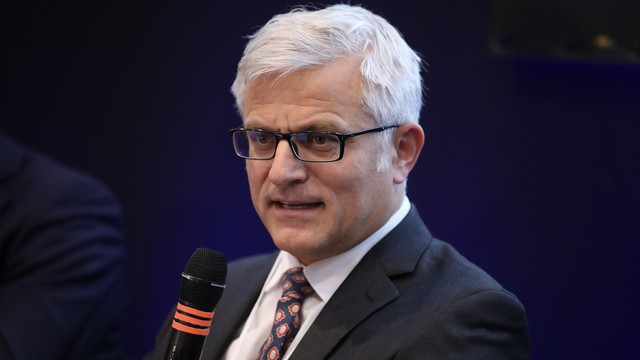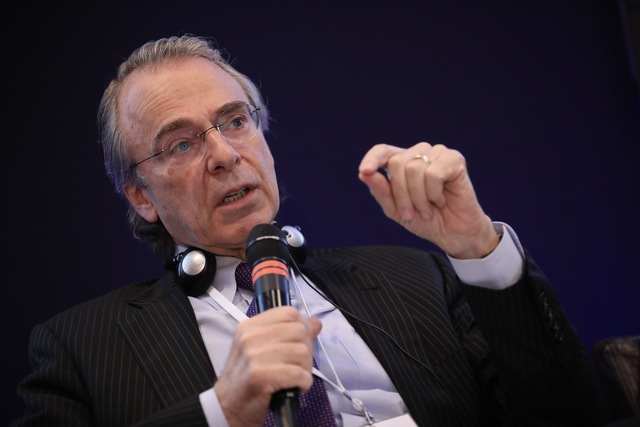Economy
Bank execs of Hungary reveal their deepest fears
How is the economic policy and economic environment for the banks?
Ádám Balog, CEO of MKB Bank labelled the country’s macroeconomic status as excellent, also from the point of view from the public, businesses and the banks, presenting the latest economic readings.In his view, greater emphasis should be put on productivity and competitiveness issues, in order to prepare Hungary for harder times by making the economy even more robust.
Radovan Jelasity, Chairman-CEO of Erste Bank Hungary said the banking sector had been waiting for the current growth rate in the past five to six years, adding that they will definitely ride this particular wave. Households are now net borrowers and the reduction of non-performing loans brought about one-off revenues. What is painful is the increasingly lower interest rate environment. The sector is at a loss about how to make up for missing revenues when it looks at the yield curve, he added.
David Moucheron, Chief Executive of K&H Bank noted it is difficult to find any bad indicator, but Hungary is lagging behind in terms of private investments, for instance, and it should catch up in this sense. Among the challenges he mentioned the transition of the industry and its adaptation to technical developments, as well as the challenge of coping with labour shortage.

József Vida, Chairman-CEO of Takarékbank said the economic climate is favourable, adding that the Takarék Group is already regarded as a large bank, and that a lot of conditions are already there for it to be profitable. László Wolf, Deputy CEO of OTP Ban also said you’d need a magnifying glass to find anything bad about the country’s macroeconomic status. Growth is on track, the budget status is good, but there are risks beyond 2020, he warned. In this respect, he mentioned the real estate sector peaking, a potential raise to interest rates and a decline in EU transfers, to which the cabinet would need to respond by implementing structural changes. OTP is present in nine countries, and the macroeconomy is in order in eight of those. Due to strong rivalry and limited acquisition potential in Hungary, OTP primarily aims for foreign expansion, exploiting the intention by competitors with smaller subsidiaries to exit some markets in the region.

László Wolf, Deputy CEO, OTP Bank
What profitability is sustainable?
Relying on efficient capital, OTP Bank expects its own return on equity (ROE) to average around 15% in the next few years, whereas ROE of around 10-15% can be realistically achieved by other efficient banks, said László Wolf.Takarékbank can maintain 6-8% in the short run and 10-12% ROE could be achieved in the longer term, opined József Vida . Citibank’s goal is to make shareholders happy by efficiency, added Kevin A. Murray.
David Moucheron said K&H expects 15% ROE in the long term, adding that the ROE figures of the last one or two years were unrealistic. Radovan Jelasity paraphrased a saying that it will turn out only after the flood subsided who was swimming naked, adding that the recent numbers should not be used to draw far-reaching conclusions. Ádám Balog said a ROE of 10% would be acceptable in the current environment, but they identified several risks, and the role of interest income could be increasingly taken over by fee and commission income.

Ádám Balog, CEO, MKB Bank
Which of the following is the most promising banking activity at the moment in terms of profitability?
Ádám Balog highlighted MKB’s traditional strengths, e.g. corporate activities and new strengths, such as digital services. Radovan Jelasity mentioned unsecured lending, lending to SME’s, card activities and asset management. David Moucheron expects growth in almost every segment, but he has also highlighted the importance of asset management for future income generation. Kevin A. Murray underlined lending to large enterprises and activities relating to services of this client group, but he also believes major growth can be expected in SME lending. József Vida named retail mortgage lending as their most promising retail segment, but he believes servicing micro and small companies can also be a key driver. László Wolf is of the view that OTP is growing in virtually every retail segment, pushing these businesses even harder by digitalisation. He also noted that OTP has large volumes in lending to large enterprises and SMEs. In his view, the key to improved profitability will be digitalisation in the long term; this will determine who can retain customers and who will lose them.
Radovan Jelasity, Chairman-CEO, Erste Bank
How do banks manage labour shortage and how well they pay coders compared to branch managers?
László Wolf skilled coders are more expensive now, they need to be paid well. Labour shortage has not caused branch closures until now, and branches will be a key element in OTP Bank’s sales also in the longer term. József Vida said Takarék Group plans to restructure its network of branches, and it will probably need smaller and smaller staff. He trusts that good branch managers will continue to be paid better than IT staff.
József Vida, Chairman-CEO, Takarékbank, FHB Bank
Kevin A. Murray quoted from Bill Gates, saying “Banking is necessary, banks are not", suggesting that coders are needed and banks need to pay them. David Moucheron the only way to achieve greater profits is through higher efficiency, which means that more business must be done with fewer people. Other types of customers use branches therefore the network’s role will also change. Banking, however, will remain a matter of confidence. Fewer experts and economists will be needed, but more psychologists who know people better will be needed. Radovan Jelasity said we should take a look at how a store looked like ten years ago and how it looks now. Most customers claim they can take of most banking services on their own. Erste would favour a supermarket rather than a typical grocery store from 30 years ago. Ádám Balog said it is not branch staff rather than the customers that are changing at a rapid pace. Banking systems need to be prepared for a continuation of this, even if it means rivalry with the largest tech firms.
David Moucheron, CEO, K&H Bank speaks in a panel discussion of bank executives at Portfolio's Budapest Economic Forum 2017 conference on 5 October 2017.
What could be the biggest risk for the banking sector?
Ádám Balog said the current low interest rate environment could make businesses complacent, while they should focus more on shoring up their capital status. Rising interest rates could cause problems, especially for small and medium-sized enterprises. Radovan Jelasity mentioned real estate project financing where risk-taking is already reached elevated. He added that coders are paid so well also due to the banks’ mandatory compliance with local regulations. David Moucheron does not see significant short-term risks, but he noted that competition in the corporate segment could become dangerous in the longer term. The biggest risk for banks lies in real estate, as it is most difficult to project where the segment will stand in three or five years’ time. The banking sector quickly forgets and takes on liabilities for the long term. Kevin A. Murray highlighted risks related to cyber security. A whole lot of criminals are lurking around banks with intentions to hack their systems who have the potential to undermine whole states. József Vida also mentioned real estate project financing, as well as labour shortage as problems affecting productivity. László Wolf noted that some problems could arise in housing projects, although OTP does lend with caution. He also mentioned a potential rise in expenditures, as well as regulatory risks, adding that about half of their development budget is spent to fend off the latter.
Kevin A. Murray, CEO, Citi Hungary & Central Europe







